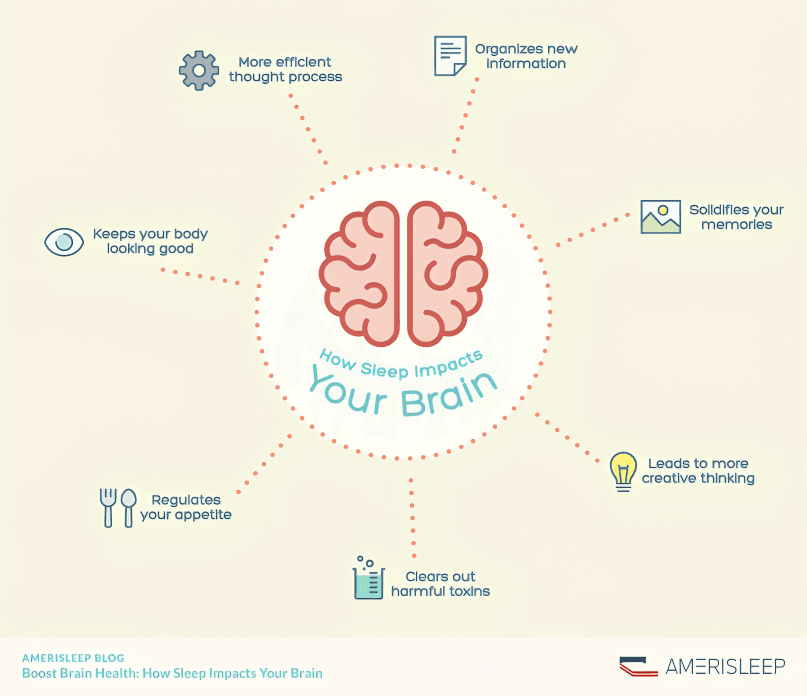
“
Understanding how sleep affects mental health is crucial in a fast-paced world where rest often takes a backseat. From emotional regulation to cognitive performance, how sleep affects mental health is both deeply complex and incredibly impactful. 1
1
”
Sleep deprivation significantly impairs emotional regulation by disrupting the balance of neurotransmitters and stress hormones, leading to heightened emotional reactivity and difficulty managing stress. 1
Chronic lack of sleep increases the risk of developing depression, as it affects the brain's ability to process emotions and cope with stress, leading to persistent feelings of sadness and hopelessness. 2
Insufficient sleep can exacerbate anxiety symptoms by increasing amygdala activity, which heightens fear responses and reduces the brain's ability to regulate emotions effectively. 3

Sleep plays a crucial role in memory consolidation; without adequate rest, the brain struggles to process and store new information, leading to cognitive impairments and memory lapses.
Disrupted sleep patterns can lead to increased irritability and mood swings, as the brain's ability to manage emotional responses is compromised, affecting interpersonal relationships and overall well-being. 4
Persistent sleep disturbances are linked to a higher risk of developing severe mental health conditions, such as bipolar disorder and schizophrenia, due to their impact on brain chemistry and function. 5
REM sleep aids emotional regulation. A Frontiers in Psychology study shows that this stage processes emotional memories. Disrupting REM sleep can cause mood instability and increase sensitivity to stress. 6
Poor sleep quality can impair decision-making abilities by affecting the prefrontal cortex, leading to difficulties in concentration, problem-solving, and impulse control. 7
Sleep deprivation can increase the risk of developing psychotic symptoms, such as hallucinations and delusions, by disrupting the brain's normal functioning and perception. 8

Chronic sleep loss can lead to increased levels of cortisol, the stress hormone, which negatively impacts mood and can contribute to the development of anxiety and depression.
Inadequate sleep affects the brain's ability to filter out irrelevant information, leading to decreased attention spans and increased distractibility, which can exacerbate symptoms of ADHD and other attention disorders. 9
The prefrontal cortex, key for decision-making, is impaired by poor sleep. The Journal of Sleep Research found that 49 hours without sleep lowers brain activity, weakening judgment and reducing focus. 10
Sleep disturbances can weaken the immune system, making individuals more susceptible to illnesses, which can, in turn, affect mental health by increasing stress and anxiety levels. 11
Lack of sleep can lead to increased feelings of loneliness and social isolation, as it affects the brain's ability to interpret social cues and maintain relationships. 12
Sleep deprivation can impair the brain's reward system, leading to decreased motivation and pleasure in activities, which are common symptoms of depression. 13
Chronic sleep loss may trigger psychotic symptoms like hallucinations. A Schizophrenia Bulletin study showed deprivation disrupts brain activity, increasing delusions—symptoms that often fade after proper sleep returns. 14
Sleep problems can exacerbate symptoms of PTSD, including nightmares and flashbacks, by interfering with the brain's ability to process traumatic memories during sleep. 15
Chronic sleep issues can lead to an increased risk of suicidal thoughts and behaviors, particularly in individuals with existing mental health conditions. 16
Sleep disturbances can affect hormonal balance, leading to mood swings and increased susceptibility to mental health disorders, especially in women during hormonal transitions. 17
Improving sleep hygiene and establishing regular sleep patterns can significantly enhance mental health by restoring cognitive functions and emotional balance.18


